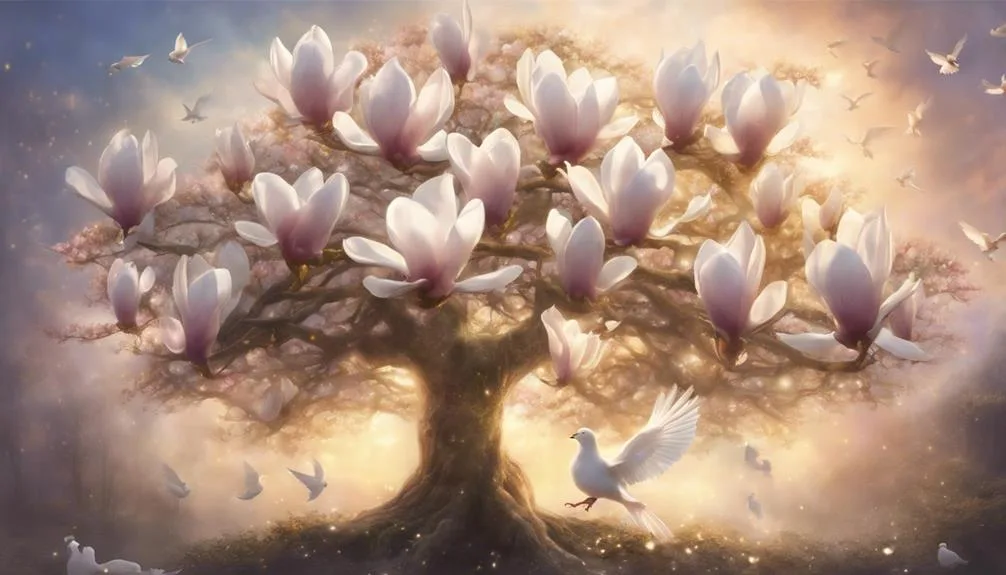Exploring the magnolia tree's significance in the Bible reveals interesting symbolism. While the magnolia tree isn't directly mentioned in biblical texts, its enduring beauty and strength often lead people to associate it with spiritual meanings.
This connection has sparked curiosity about what the magnolia might symbolize in a religious context. Let's look at how the qualities of the magnolia tree might align with biblical teachings and spiritual interpretations.
Key Takeaways
- Magnolia tree symbolizes divine grace, purity, and beauty in the Bible.
- Represents spiritual growth, resilience, and enduring qualities.
- Signifies purity, nobility, and grace through its flowers.
- Reflects themes of beauty, grace, and the presence of God in creation.
Magnolia Tree Symbolism in the Bible
In the Bible, the magnolia tree is often seen as a symbol of purity and beauty, representing divine grace and elegance. Biblical references to the magnolia tree are limited, but its cultural significance and interpretations have deep roots. The magnolia's large, fragrant flowers have been linked to the idea of purity and perfection, mirroring the innocence and beauty often associated with biblical figures. Some interpretations suggest that the magnolia tree symbolizes the presence of God or the beauty of creation as a reflection of divine grace.
Culturally, the magnolia tree has been embraced as a symbol of perseverance, endurance, and dignity, qualities that resonate with various biblical teachings. The tree's evergreen nature and ability to withstand harsh conditions have led to interpretations of resilience and faithfulness. In some traditions, the magnolia tree is seen as a representation of the purity of the Virgin Mary, further emphasizing its connection to divine grace and beauty. The symbolism of the magnolia tree in the Bible serves as a reminder of the intricate relationship between nature, spirituality, and human interpretation.
Significance of Magnolia in Scriptures
The significance of magnolia in scriptures lies in its symbolic representation of purity, beauty, and divine grace. Magnolias hold a special place in biblical references and symbolism, reflecting profound spiritual significance and interpretation.
- *Symbol of Purity:* In the Bible, the magnolia flower is often associated with purity, reflecting the innocence and cleanliness of the soul before God.
- *Representation of Beauty:* Magnolias are seen as a symbol of beauty in scriptures, mirroring the loveliness and splendor found in God's creations.
- *Divine Grace:* The magnolia tree is sometimes interpreted as a representation of divine grace, highlighting the unmerited favor and blessings bestowed upon individuals by God.
When considering the significance of magnolia in scriptures, it becomes evident that these beautiful flowers carry deep spiritual meanings that resonate with themes of purity, beauty, and divine grace as portrayed in various biblical contexts.
Biblical Interpretation of Magnolia Tree

Symbolizing purity, beauty, and divine grace, the magnolia tree holds a profound biblical interpretation that reflects spiritual significance and divine symbolism. In religious interpretation, the magnolia is often associated with symbols of purity and nobility. Its large, fragrant flowers are seen as representations of beauty and grace, reflecting God's glory and the splendor of creation. The magnolia's evergreen nature further emphasizes its enduring qualities, symbolizing eternal life and the unchanging nature of God.
Furthermore, the magnolia tree's strong and resilient branches are often linked to the biblical concept of strength and stability. Just as the tree stands firm against harsh conditions, believers are encouraged to remain steadfast in their faith. The white petals of the magnolia blossom are sometimes interpreted as symbols of innocence and the purity of heart required to enter the kingdom of heaven.
Magnolia Tree: Spiritual Meaning
With profound spiritual significance and deep symbolism, the magnolia tree embodies a rich spiritual meaning that transcends mere botanical beauty. The magnolia tree represents spiritual growth and transformation, mirroring the journey of individuals seeking enlightenment and inner peace. This majestic tree, with its large, fragrant blossoms, serves as a reminder of the divine beauty that surrounds us and the importance of connecting with the spiritual realm.
The magnolia tree's evergreen leaves symbolize resilience and strength, reflecting the idea that spiritual growth requires perseverance and steadfastness.
The tree's beautiful, fragrant flowers embody purity and grace, reminding us of the inherent beauty present in the process of spiritual transformation.
The magnolia tree's deep roots signify grounding and stability, highlighting the importance of staying rooted in one's beliefs and values while embarking on a journey towards spiritual enlightenment.
Understanding Magnolia Tree in Religion

Exploring the significance of the magnolia tree within religious contexts reveals profound layers of symbolism and spiritual connections. Magnolia trees have a rich history of tree symbolism in various religions, representing purity, beauty, and perseverance. In Christianity, the magnolia tree is often associated with the concept of resurrection and new beginnings due to its ability to bloom vibrantly after harsh winters, mirroring the idea of spiritual renewal and growth. Moreover, its large, fragrant flowers are seen as symbols of grace and dignity, reflecting the divine beauty found in creation.
The religious significance of the magnolia tree extends beyond Christianity. In certain Eastern traditions, such as Buddhism and Taoism, the magnolia tree is revered for its elegance and simplicity, embodying a sense of purity and enlightenment. Its evergreen nature further emphasizes the tree's connection to eternal truths and spiritual resilience. Across different faiths, the magnolia tree serves as a powerful reminder of the interconnectedness between nature, spirituality, and human existence, inviting individuals to reflect on the deeper mysteries of life.
Conclusion
The magnolia tree, with its rich biblical symbolism, embodies purity, beauty, and spiritual growth. Its mention in scripture highlights God's grace and blessings, while its fragrant blossoms remind us of the divine presence in our lives.
This deep significance encourages us to reflect on faith, hope, and the Creator's eternal love. What better way to contemplate our spiritual journey than through the magnolia's enduring beauty, a symbol of the divine interwoven with our existence?

